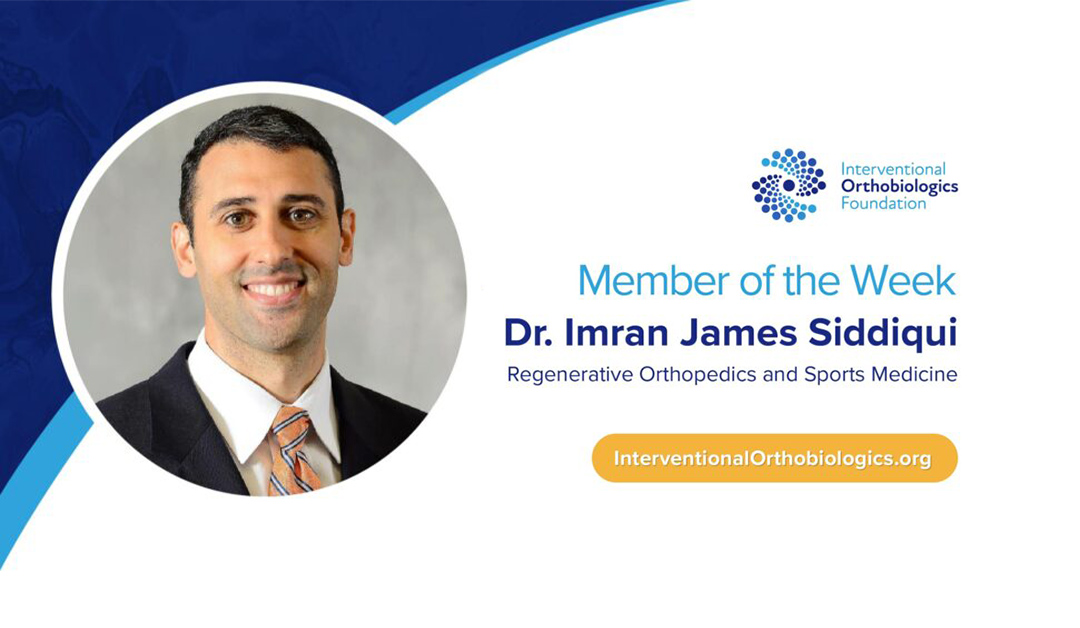Our Member of the Week blog introduces you to our fellow level members, showcasing their unique work and commitment to IOF. We feature different fellows who have made extraordinary contributions to the field of Interventional Orthopedics.
To be considered for this feature, please email us.
IOF Member Of The Week: Dr. Imran James Siddiqui
Our latest Member of the Week feature takes us to Maryland to meet Dr. Imran James Siddiqui of Regenerative Orthopedics and Sports Medicine.
Dr. Imran James Siddiqui is board certified in both Physical Medicine and Rehabilitation and Musculoskeletal Ultrasound. He received his medical degree and graduated Cum Laude from Jefferson Medical College and was inducted into the Alpha Omega Alpha Medical Honors Society. He went on to complete his residency at Harvard Medical School and Spaulding Rehabilitation Hospital where was awarded resident teacher of the year.
Since, Dr. Siddiqui has served as an instructor in musculoskeletal ultrasound (MSKUS) for Harvard Medical School, the Orthosound Educational Institute, Gulfcoast Ultrasound Institute (GCUI), and American Academy of Physical Medicine and Rehabilitation (AAPMR). He is a primary lecturer at the GCUI annual MSKUS board review course. He has also lectured at multiple AAPMR workshops on regenerative medicine. He has published various peer reviewed journal articles and book chapters on ultrasound and orthobiologic injection techniques. Recently, Dr. Siddiqui joined IOF’s leadership team as a member of the curriculum committee.
Currently, Dr. Siddiqui serves as partner and director of clinical operations at Regenerative Orthopedics and Sports Medicine. With six clinics and counting, it is the largest orthobiologic practice in the Washington, DC area. While Dr. Siddiqui still focuses on research, education and clinical leadership – his true passion is helping his patients get back to doing the activities they enjoy. While he treats nearly any orthopedic condition, he has a keen interest in hip, and core injuries. He often takes on complicated cases who have seen multiple clinicians with limited success and enjoys working with them to properly diagnose and treat their condition.
At home, Dr. Siddiqui enjoys spending time with his wife and 6 children. He continues to stay active through high intensity training and enjoys skiing, snowboarding and playing basketball and golf.
Meet Dr. Imran James Siddiqui
Practice website:
Regenerative Orthopedics & Sports Medicine
Connect with Dr. Siddiqui:
Q&A with Dr. Siddiqui
IOF: Who are your biggest mentors in regenerative medicine & why?
Dr. Siddiqui: I have been very fortunate to have worked closely with some incredible physicians whose work has advanced the field of orthobiologics including Steve Sampson, Victor Ibrahim and Gerry Malanga.
Nevertheless, it was Joanne Borg-Stein who initially introduced me to regenerative medicine and was the mentor who laid the foundation for how to become a leader in orthobiologics. While working closely with her during my residency, I witnessed first hand how her patient-centered, evidence based approach to regenerative orthopedics resulted in incredible outcomes and patient satisfaction.
It is quite likely I never would have embarked on a career in regenerative orthopedics had it not been for Dr. Borg-Stein’s mentorship, guidance and incredible aptitude for teaching. By example, she taught me how one could be a great clinician, educator, researcher and leader simultaneously. Thank you JBS!
IOF: What is your best advice for others wanting to get into regenerative medicine?
Dr. Siddiqui: The best advice I can give those beginning to practicing regenerative orthopedics is to master musculoskeletal ultrasound. Outside of the spine, ultrasound is the foundation for everything one does in regenerative orthopedics.
For successful orthrobiologic treatments, precision is paramount. First, one must precisely diagnose all pathologies contributing to the patient’s condition. Second, one must precisely place the orthobiologic into all areas of injury. Strong diagnostic and interventional ultrasound skill is the only way to ensure that this level of precision is achieved. Ultimately, if one really wants to get into regenerative orthopedics, they should learn musculoskeletal ultrasound first.
IOF: Where do you see the field of regenerative medicine going in the next 5 years?
Dr. Siddiqui: In the next five years, I hope to see regenerative orthopedics take its proper place alongside traditional orthopedics as first line interventions to household orthopedic conditions.
However, to get there, there is an incredible amount of work to be done. We, as a medical community, need to better organize and continuously strive to advance regenerative orthopedics through research, education, standardization and certification. We have seen what orthobiologics can do for our individual patients.
Now is time to take regenerative orthopedics to the next level and change the way general orthopedics is practiced. I forsee IOF playing an encompassing role in accomplishing these goals and moving regenerative orthopedics into the mainstream.

